Wisdom teeth extraction is a common dental procedure to remove the third molars. These are called wisdom teeth because they typically appear between the ages of 17 and 25 when, historically, children were considered to have reached maturity. Because of their late arrival, wisdom teeth often cause problems due to their size, position, and need to be removed. As leading wisdom tooth specialists in Philadelphia, Penn Dental Family Practice (PDFP) explains what you need to know if you or a loved one needs wisdom tooth surgery.
Wise Up With These Wisdom Teeth Extraction FAQ & Answers
Why do you need wisdom tooth removal?
 Not enough space. When there isn’t enough room in the jaw for the teeth to fully emerge, it can cause teeth to become trapped or grow at an angle, leading to pain and potential damage to surrounding teeth.
Not enough space. When there isn’t enough room in the jaw for the teeth to fully emerge, it can cause teeth to become trapped or grow at an angle, leading to pain and potential damage to surrounding teeth.
Crowding. If the jaw is already crowded with teeth, the emergence of wisdom teeth can further disrupt the alignment of existing teeth, potentially causing misalignment or shifting.
Infection. It can be difficult to properly clean and maintain good oral hygiene in the hard-to-reach areas where wisdom teeth are located. This can lead to gum disease, tooth decay, and other oral health issues.
What are the symptoms?
Symptoms vary and may include:
- Pain and Discomfort: You may experience pain and discomfort in the back of your mouth from wisdom teeth pushing against existing teeth or the jawbone.
- Swelling and Redness: This indicates that wisdom teeth are coming in and causing inflammation.
- Jaw Stiffness: This, or difficulty opening your mouth fully, can be a sign of impacted wisdom teeth.
- Headaches: Wisdom teeth pushing against other teeth can cause headaches and migraines.
If you are experiencing any of these symptoms, see your dentist for a thorough examination. X-rays may be taken to assess teeth position and determine the best course of action.
What kind of dentist removes wisdom teeth?
Your dentist will refer you to an oral surgeon, a dentist who has undergone additional years of training specifically focused on surgical procedures, including wisdom tooth extraction. At PDFP, we are proud to have a team of highly skilled oral surgeons who are all medical doctors, which is rare for a dental practice.
How do I prepare for wisdom tooth surgery?
You may be asked to:
- Fast beforehand.
- Avoid certain medications that can increase bleeding.
- Arrange for transportation to and from the appointment.
How long does the surgery take?
It typically takes up to an hour.
What happens during wisdom tooth extraction surgery?

Depending on the complexity and your personal preferences, you’ll be put under local sedation or general anesthesia.
Once the anesthesia has taken effect, the oral surgeon makes an incision in the gum to access the tooth. If it’s impacted or stuck beneath the gum line, the surgeon may need to remove bone or tissue to fully extract it. The tooth may be divided into smaller pieces for easier removal.
After removal, the oral surgeon cleans the area and stitches up any incisions made. A gauze is placed over the extraction site to control bleeding. You’ll receive post-operative instructions on how to care for the extraction site and manage discomfort or swelling.
How long does wisdom teeth recovery take, and what’s it like?
Recovery after wisdom teeth removal varies, but it generally takes a week. The first few days are typically the most uncomfortable, with common swelling and pain. You may experience difficulty opening your mouth fully.
- Take prescribed medications: Your oral surgeon may prescribe pain medication or antibiotics.
- Apply ice packs: Apply these on the cheeks near the extraction site to help reduce swelling and discomfort.
- Rest and relax: Avoid strenuous activities for the first few days to allow your body to heal properly.
- Stick to soft foods: Eat foods such as mashed potatoes, yogurt, soup, and smoothies during the initial days. Avoid hard or crunchy foods that can irritate the extraction site.
When can I return to work?
It depends on you and your job. It’s generally recommended to take a few days off to allow for proper healing and minimize discomfort or complications. But if your job involves physical labor or requires strenuous activity, it may be necessary to take additional time off.
Are there complications or side effects of wisdom tooth extraction?

Complications are relatively rare. One potential complication is a dry socket, which occurs when the blood clot that forms in the extraction site becomes dislodged or dissolves before the wound completely heals. This exposes the underlying bone and nerves, causing severe pain and delayed healing.
To reduce the risk of developing a dry socket:
- Avoid drinking through a straw or smoking so as not to dislodge the blood clot.
- Gently rinse with salt water to keep the extraction site clean.
Other potential complications include infection, excessive bleeding, nerve damage, and sinus complications. If you experience any of these complications, contact your oral surgeon.
How much does wisdom teeth extraction cost? Is it covered by insurance?
Costs can range from $225 to $600 per tooth. If multiple teeth need to be removed or if there are complications, the cost may increase. To determine the exact cost, talk to your oral surgeon.
As for insurance coverage, some dental or medical insurance plans may cover a portion of the cost, while others may not cover it at all. It’s important to check with your insurance provider about your plan.
Wisdom Tooth Extraction at PDFP
Families looking for wisdom tooth specialists in Philadelphia have long turned to Penn Dental Family Practice. Our oral surgeons are all medical doctors, and you benefit from this additional expert medical knowledge and experience and receive the leading techniques in patient care. Make the wise choice and schedule your wisdom teeth appointment today.


